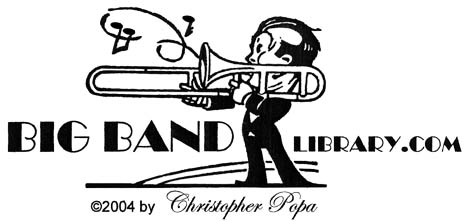
vital stats:
given name Raymond Noble
birth Dec. 17, 1903, Brighton, England
death Apr. 3, 1978, cancer
father a surgeon
uncle T. Tertius Noble, organist at St. Thomas Episcopal Church, New York City
brother Warwick
brother Dudley
wife Gladys
hobby gardening
residences Isle of Jersey, off the coast of England; Santa Barbara, CA, 1970s-
Noble himself decided to come here in October 1934, bringing along his drummer - manager, Bill Harty, and his vocalist, Al Bowlly. To supplement those men, a new band of Americans was assembled, including Charlie Spivak and Pee Wee Erwin (trumpets), Glenn Miller and Will Bradley (trombones), Johnny Mince (clarinet), Bud Freeman (tenor saxophone), Claude Thornhill (piano), and George van Eps (guitar).
They opened on June 1, 1935 at the Rainbow Room, on top of Rockefeller Center, in New York City.
For the Victor label, the band recorded such popular sides as The Old Spinning Wheel, Isle of Capri, and Paris in the Spring, not to mention Noble's own compositions, Love Is the Sweetest Thing, The Very Thought of You, The Touch of Your Lips, and I Hadn't Anyone Till You.
In 1937 he disbanded and went to Los Angeles, where for many years he conducted an orchestra on the radio. Between songs on "The Chase and Sanborn Hour," which starred comedian Edgar Bergen, for example, he acted as a comic foil for Bergen's dummies, Charlie McCarthy and Mortimer Snerd. In reality, that image as a dim-witted Englishman was false.
Noble also made a lot of recordings with his band on Brunswick and Columbia from 1937-50, including some backing, variously, the singing of Fred Astaire, Tony Martin, and Buddy Clark.
Ray Noble in his own words:
"The original 'New Mayfair' house band I inherited from the Savoy Hotel bandleader, Carroll
Gibbons . . . consisted very largely of his own lads, who, in those affluent days, used to
arrive at the studio in riding britches, fresh from a session on horseback in Hyde Park."
" . . . the fans should stick to their gramophone records, or, for second choice, the dance
hall. There's more good genuine jazz music performed in the ballroom than will ever see
the light of day in Albert Hall."
[ in later years ] "I'm afraid, old boy . . . that I have become a classical music buff."
Around the fall of 1953, Noble decided to enter semi-retirement, able to live off royalties from those aforementioned wonderful songs (plus others he wrote, including Cherokee and
Good Night, Sweetheart).
At one point, he and his wife spent about six months of each year traveling.
A friend, John Jensen, later revealed that Noble was composing right up until his death.
"[He] had a magnificent grand piano in his living room and on it I would see some penciled composition he was working on," Jensen reported. "Also on the piano was a silver cigar case, given to him by his American band members at Christmas of 1935."
In 1984, drummer Bobby Rosengarden led a 9-piece ensemble in a celebration of Noble's music at the Rainbow Room, though critic John S. Wilson warned that patrons were in for a disappointment.
"He plays tunes that Mr. Noble's orchestra played, or might have played, but not the way Mr. Noble offered them except for a single transcription of a Noble arrangement, 'Love Locked Out,' Wilson wrote in the New York Times. "That is used as part of a medley, as are most of Mr. Rosengarden's selections, and is forced as a result into a slightly faster tempo that it should have."
sources:
Leonard Feather, "Jazz: When Ray Noble Was on the Top of the World," Los Angeles
Times, Apr. 23, 1978, p.M41.
Charles Garrod, Ray Noble and His Orchestra (Zephyrhills, FL: Joyce Record Club,
1991).
John Jensen, posting to alt.music.big-band, "Ray Noble recordings," ca.1995.
Richard Lamparski, "Ray Noble," in Whatever Became of ... ?: Fifth Series (New York
City: Crown Publishers, 1975), pp.102-103.
"Orchestra leader Noble dies at 74," unidentified newspaper, Apr. 4, 1978.
"Ray Noble Dies; Wrote 'Goodnight, Sweetheart,'" Los Angeles Times, Apr. 3, 1978, p.A2.
John S. Wilson, "Music: Bobby Rosengarden Offers Salute to Ray Noble," New York Times,
May 28, 1984, p.13.
---, "Ray Noble, 71 [ sic ], Dies; Popular Composer," New York Times, Apr. 4, 1978, p.36.
Joel Whitburn, Pop Memories 1890-1954: The History of American Popular Music
(Menomonee Falls, WI: Record Research, Inc., 1986), pp.336-338.
I would like to expand this tribute with, if possible, a new interview of someone who was important to Ray Noble's life or career. Are you an alumnus of his band, a member of his family, or a collector who is knowledgeable about his accomplishments? Please contact me via e-mail
return to "Biographical Sketches" directory
go to Big Band Library homepage
The big bands are back
in a new and exciting way!
RAY NOBLE
"IT'S JUST THE THOUGHT OF YOU"
by Music Librarian CHRISTOPHER POPA
September 2008
There were several achievements for which the public eventually knew him, and it all started before he even set foot in the United States.
As a boy in England, he studied piano and arranging.
When Melody Maker, a weekly music magazine, sponsored a competition for arrangers, he was named the winner. Two years later, he was hired as a staff arranger for the British Broadcasting Corporation (BBC).
In 1929, he became musical advisor for His Master's Voice (HMV) Records, where one of his duties was to conduct its house band, the so-called (New) Mayfair Orchestra, made up of top London musicians.
After Noble's HMV discs began to be exported, he developed a following overseas, especially among college students.

Ray Noble, ca.1935